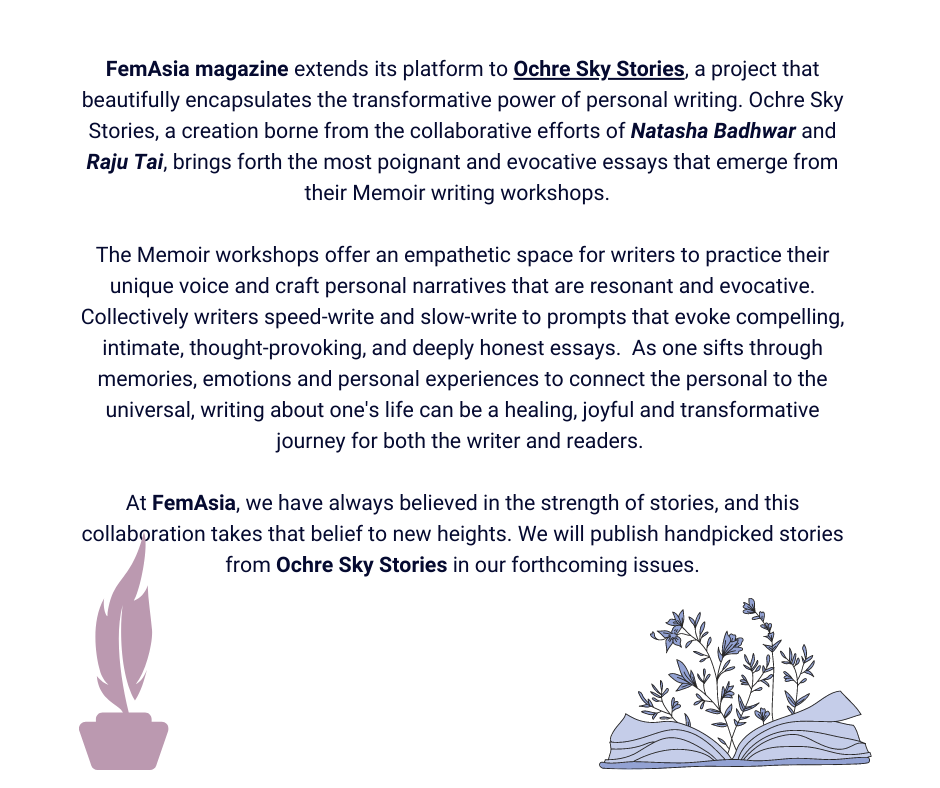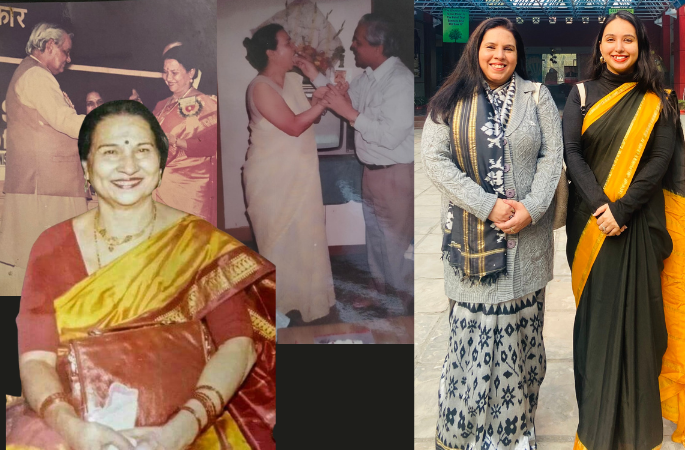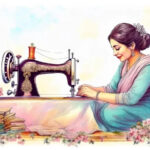I was 13 years old when I lost my beloved Nani, my maternal grandmother. It was a young enough age to not have created noteworthy memories yet an old enough age to register memories deeply. Since then I have put together the myriad fragments of her being inside my head to build her into a constant companion. Conversations with families, old stories told by relatives, pictures and insights from my Nanu along with the feeble documentation of her significant work. Yet, what brings me closest to her is her intricately put together collection of sarees, one that was recently passed on to me by Maa.
Nani is fondly remembered as an eternally dressed woman by every single person who ever met her. When I see her pictures now I realise that it was her internalised sense of confidence which she draped around herself in the form of a saree. For that simple piece of plain cotton cloth in my hand never matches the elegance it embodied when worn by her.
Nani was less than a year old when her family fled to present-day India during the tragic partition with Pakistan. Amidst the chaos and violence, the little child in the arms of the parents lost her hearing and eventually her speech. She was raised by a resettling business family, struggling to find its roots in the brutal city of Delhi. The big joint family gave her a unique sense of dignity and strength but could not give enough education and special attention. Her fancy sarees of zari work remind me of her wealthy and supportive background with the flaws of inadequacy hidden behind the shimmer.
Working as an Arts Trainer with the Delhi Foundation of Deaf Women, Nani hoped to empower other deaf women with skills and techniques for self-employment. She was inherently self-reliant and strived to nudge women on a similar path. It is, therefore, no surprise that many of her vibrant banarasi silk sarees which I remember with awe, are ones that she had gifted to her friends, colleagues and relatives. She is remembered by them as someone who was always there for others as a generous and empathetic person.
Nani looked ethereal in her wedding chanderi saree, glowing with the delight of love and togetherness. During their days of social work, Nanu and Nani, two deaf individuals met at a community gathering. It was love at first sight. It was a love they nurtured over the years. A love marriage, an act of rebellion, was a way for them to build something of their own in a world designed to deny everything to those with any form of physical impairment. But, with their love, marriage and children, they transcended all barriers, building their own little world of joy and togetherness in this big, wide world of despair and ruthlessness.
Through the difficult years of making ends meet while raising three children, they rarely had surplus money for indulging in shopping. Yet, Maa tells me “She was always the most beautiful woman in the room, no matter what she wore. Fashionable and chic.” I now realise how resourceful Nani was. She managed to turn any ordinary piece of cloth into a saree to die for. Perhaps, that is how she managed to toil hard enough to buy a house in an economically unforgiving city like Delhi while also turning that house into a warm and affectionate home.
When Nani won the National Award as a Role Model Person with Disability in India, with her family cheering for her in the audience in sign language, her beautiful yellow kanchipuram silk saree shone on the stage with the pride of her achievements. She managed to not just fight the limitations imposed upon her by the virtue of gender and disability in an unequal society, she in fact powerfully conquered them all, inspiring many others.
Recently, there was an event at work, a non-profit organisation aimed at empowering deaf individuals through education and employment programmes. It was founded by my mother as a tribute to her parents. As the little girl whose “mother tongue” was sign language, Maa grew up navigating a discriminatory world around her parents. She went on to become a determined woman hoping to contribute towards a more accessible and inclusive world. Naturally, I grew up looking up to two extraordinary women in my life, standing tall on their resilient shoulders. Inheriting this passion for social impact, our family’s legacy of creating change, I wore my nani’s beautiful chiffon saree, hosting a graduation ceremony for the successful students. I never felt more beautiful and self-assured than in that moment of being adorned by my Nani’s saree at a platform that was built as a labour of love by Maa.
It is not just the sarees she left behind, but a part of herself in me. It is this that constitutes my greatest treasure. I drape figments of Nani’s strength, courage and empathy around me when I wear the sarees that she left behind.
This essay was written in response to the prompt “The dress she left behind” in the Ochre Sky Memoir writing workshop facilitated by Natasha Badhwar and Raju Tai.




